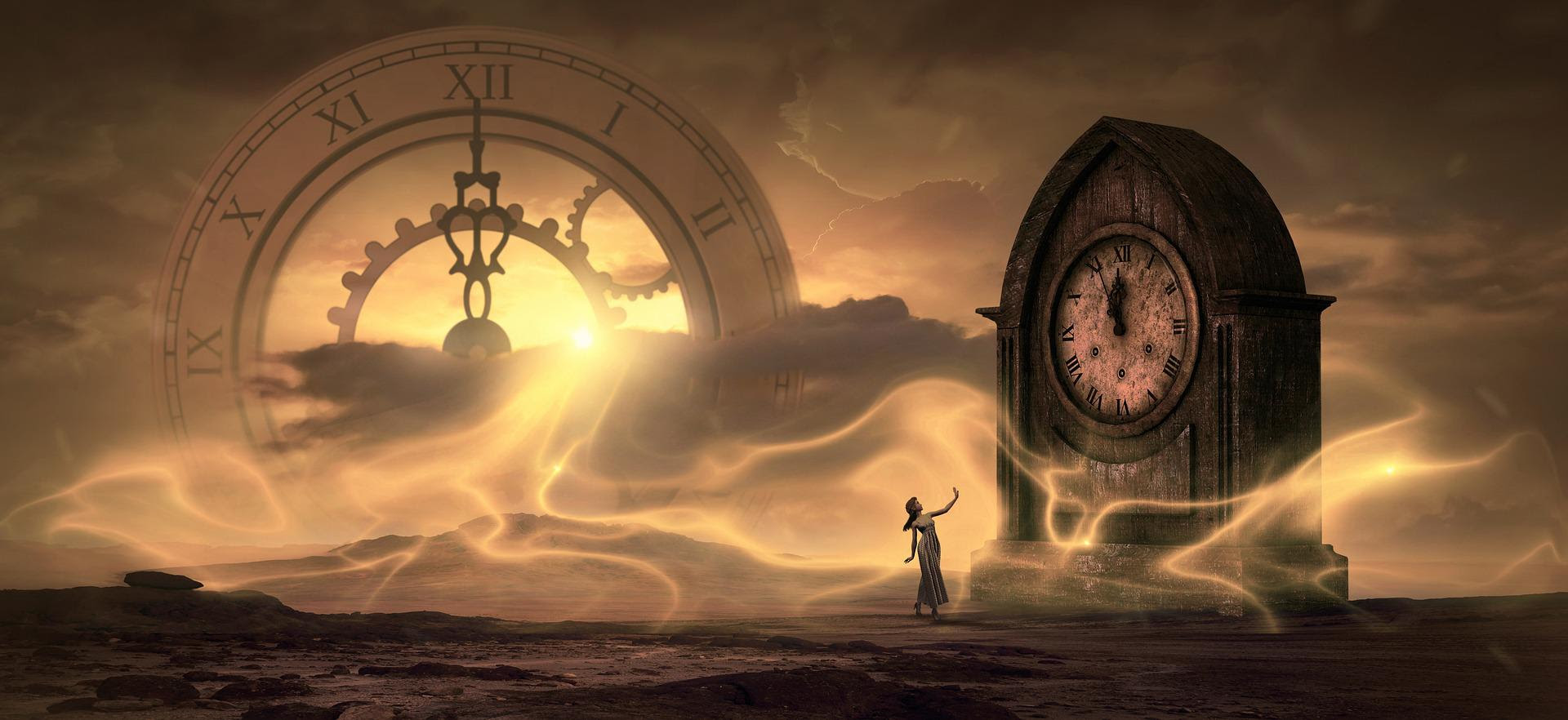“In a Kairos moment, the world stops…and it opens.”
-Robert Moss, Sidewalk Oracles
Late Summer Greetings friends!
Every year as the summer begins to wane, we look back and think, how time flies!
Desperate to get the most out of the remaining season, we do more and more, filling our schedules to the brim with the last remaining kernels of summertime – sure that doing is the secret to mastering time once and for all.
It does make some sense – if we fill our time, we’re always making the most of it, right? Always one step ahead of the sneaky time devil, never in danger of wasting any time at all.
We tend to operate this way not only in the sweet last remaining days of summer, but pretty much – well, all the time.
But if our time is always so beautifully full and abundant, then why does it still always feel like time is flying by??
‘Time flies’ is one of those common sayings we’ve uttered so many times we barely give it a second thought.
Catchy sayings about time abound in our culture: Time waits for no one. Don’t waste time! I’m trying to save time. I’m just killing time. We’re in a race against time! We have all the time in the world. Time is money. How do you spend your time? Use your time wisely. Lost time is never found again. Time is slipping away.
You’ve heard these before, yes?!
These phrases say a lot about the very nature of our relationship with time.
A relationship that is based on scarcity, with a thief who takes from us.
Believing that time is a limited resource we convince ourselves that we must control it, master it, locking ourselves into an endless battle against a force that won’t stop marching ever forward.
Our struggle can feel fruitless. So we laugh, throw our hands up in the air and say, there’s just never enough time!
You either laugh or you cry – because in time lives also our greatest fear. That one day our time will finally run out, our ticker will finally stop ticking – and other time related sayings about our personal end of days.
Time has become a commodity as valuable to us as money, but one we try in vain to save. Despite our best efforts to stockpile time, in the end, everyone is given the same amount of time – in a day, in a week, in a year.
But perhaps what keeps us so gripped by time is that one unknown when it comes to this usually measurable resource – how much of it we have in a lifetime.
Which puts us face to face with the one question we never want to acknowledge, and the one answer we never want to face:
That we don’t know how much time we have on this Earth, but we do know that one day we will be gone.
It’s the great question – if you knew that today were your last day on this Earth, what would you do? Would you live your life differently if you knew you had exactly one month, or one year, or one hundred years left to live?
Not knowing, we exist somewhere between believing that time is endless, and feeling terrified that we’ll run out too soon.
Though we try our best to manage time, it seems that time is actually the ultimate controller, pulling the strings of our lives.

But do you want to know a secret? There is an art to mastering time, to ending the great race.
And it doesn’t have anything to do with doing more; in fact, it’s quite the opposite.
💫 Kairos Time and Chronos Time ⌛
“Kairos time is when you are released, if only for a moment, from the breakable laws of linear time and space, when things come to you, and you to them, by a different logic.” -Robert Moss, Sidewalk Oracles
So how do we change our relationship with time?
Our most common sayings about time are speaking to our relationship with Father Time, also known as ‘chronos time.’
Chronos is one of two Greek words meaning “time.” It’s also the root of the words “chronicle” and “chronological.”
Chronos time is the measurable, quantifiable aspect of time. It is linear time – recorded by calendars to measure a year, by clocks to measure a day.
It is the more masculine/yang aspect of time. It is based on external measurements over internal feelings and sensations.
Tied only to Chronos time, we may go to bed at a certain time not because we feel tired, but because it is our bedtime. We may wake up by an alarm clock that cares little that we desperately desire more sleep. We may eat at prescribed hours because those are the agreed upon hours that a person should eat.
We may go to our job for eight hours not because we always have eight hours worth of work, but because we are getting paid to be there for eight hours. And we may spend forty hours there each week not because that feels right in our soul, but because someone decided that forty hours was the correct measurement of a workweek.
Living our lives by Chronos time alone, we may find that nearly every moment of our lives is tied to something happening at the ‘right’ time on the clock. That we’re scheduled so tightly we barely have room to breathe, let alone think or truly feel about what’s on our insides.
But unlike us, the Greeks also had a second word for the concept of time: “Kairos.”

“In a Kairos moment, the world stops…and it opens.” -Robert Moss, Sidewalk Oracles
Whereas Chronos time is the measurable, quantifiable aspect of time, Kairos time is the immeasurable qualitative aspect of time.
It expands and deepens our perception of time.
It is time that seems to exist outside of time, and also deep inside of time.
Kairos time is about the quality of time; it is associated with the concepts of synchronicity, flow, intuition, slowness, being fully present, the NOW, a moment of opportunity, that feeling when time stops, when we feel forces beyond chance at play.
It is the more feminine/yin aspect of time.
Kairos moments have a numinous, spiritual, sacred, otherworldly quality to them. It’s those moments of feeling truly connnected to ourselves, to nature, to community, to the divine. Sometimes we can access these moments in meditation, and sometimes the moments come and find us in our daily lives.
Think about how slowly time seems to move when you’re doing absolutely nothing. Or when you’re bored! Or when what you are doing is consciously practicing the art of doing nothing – and enjoying it immensely.
It is the feeling of being at the right place at the right time, the happy serendipitous coincidence, the moment of opportunity that feels like it could change your life.
It’s those moments when time literally seems to stand still.
Locking eyes for the first time with your future lover and feeling time slow down for an instant. Meeting a future friend or mentor for the first time and having that nagging feeling that you somehow already know each other. The job opportunity of a lifetime that comes so wildly out of the blue and gives you the distinct perception of standing at a very important crossroads in your life.
It is also the simplest of moments of holy perfection like slowing down to take in a sunset, gazing at the stars and suddenly understanding your place in the universe, sipping your morning coffee or tea and feeling like everything is going to be ok.
It’s immersing yourself in time and getting lost in something you love – those times when you completely forget to look at your watch at all.
“When Kairos is in play, ordinary time is either suspended or elastic.” -Robert Moss, Sidewalk Oracles
It’s also seizing a burst of inspiration and finding we produce a higher quality of work with much less effort than we do by trying to force it (I share my personal story with this below!).
Kairos time invites us to re-imagine the definition of the ‘right’ time; instead of being exclusively bound by the external measurements of time – “because it’s 4pm, because it’s Tuesday” – we allow ourselves to be open also to internal markers of right timing – “because it feels right, because I’m inspired.”
This is especially important for creative pursuits. I don’t think that anyone suffers from a lack of creativity, but moreso a lack of knowing how to create the right conditions to capture our inspiration.
Obviously, we need both Kairos and Chronos time in our lives in order to live in an interdependent society. If everyone acted only and exclusively on their inner feelings and moments of inspiration, it would be chaos.
What time is the meeting? Whenever everyone individually feels inspired to show up. Yeah, no that’s not gonna work! At least not in our culture.
But in our overly-scheduled calendar-dependent culture, we can use that to our advantage. We can let Chronos and Kairos work together, as they’re meant to be.
We can use Chronos time to schedule in the Kairos time. No we can’t schedule when we want a moment of synchronicity – a meaningful coincidence that feels tied to the greater forces of the universe – to occur for us, but we can start to create enough white space in our calendars to begin to even be aware of them.
We can be so exclusively tied to Chronos time that we don’t allow the spontaneous moments of Kairos time to enter into our awareness.
Sometimes a moment of synchronicity, a burst of inspiration, a perfect opportunity, may occur and we’re too busy to even notice. We just steamroll right on past, onto our next appointment and deadline.
We miss not only the big stuff – perhaps orchestrated by the greater forces of the universe itself for our personal benefit, no big deal! – but the small stuff too.
We miss the gorgeous sunsets, the priceless smiles and snugs from our children and pups, the deep conversations with kindred spirits – the moments that take us outside of time and remind us that everything is going to be ok.
By scheduling white space into our calendar we force ourselves to start to use time in a different way altogether; we allow ourselves the time and space to be open to the Kairos moments that come our way, and we start to actively seek them out as well.
And we remind ourselves that of course we need both, – but if Chronos time is what maintains order in our lives, Kairos time is what nourishes the soul.
💫 Mother Earth and Father Time ⌛
No one can make you savor a sunset but you, and it’s going to require a temporary stop of ‘being productive.’ Lucky for us, this time of year – Late Summer – is the perfect season to support our efforts at slowing down, carving out white space on our calendar, and integrating more Kairos time into our lives.
In Chinese Five Element Theory, there is a fifth season beyond our usual four – the season of Late Summer.
This last week of August ushers in this short and sweet month-long season, lasting until the Fall Equinox and the beginning of the autumn season in mid-September.
Though we don’t officially have the language or framework for this season in our culture, I think we nonetheless feel it. Sure, externally the weather may continue to look the same as summer, but internally I think we sense a shift afoot.
Energetically, this is the shift from yang into yin. And it is a big transition!
The yang energy of Summer is fiery, fast, flickery, expansive, hot, social, passionate, ungrounded. And before this completely gives way to the cool, still, grounded yin energy of Autumn, there is Late Summer – a time of balanced yin and yang.
The natural course of Fire is to die down eventually; like a bonfire at the end of the night, the flames return to the earth, settling down into warm glowing embers. This is the energy of Late Summer. Slowing down, releasing heat, turning inward, rooted, grounded, abundant – returning to the Earth.
If our lives are typically bound by the masculine/yang measurements of Father Time, it is Late Summer that perfectly ushers us into the beginning of the feminine/yin cycle, a time when we more naturally feel connected to Mother Earth.

As we pay attention to the wisdom of nature and the energy of the seasons that surround us, we may find that it feels more natural to start to slow down or begin to turn inward at this time of year.
Or, maybe we find that we feel sadness at the ending of summer.
Maybe we feel stuck in this transition time and not quite ready to let go of the summer and what was.
We may resist releasing that comforting feeling of facing outward, of going going going, and doing doing doing, that fiery masculine yang energy that we are so culturally accustomed to.
We can ask, why do we resist it?
What is it about slowing down, about turning inwards that makes us uncomfortable?
If you notice resistance or discomfort this time of year as summer begins to give way to autumn, I recommend spending some time exploring the following questions over the next few weeks of Late Summer:
Why is it hard for me to welcome in with open arms and joyful heart the season that allows us to move slower, do less, and self-reflect?
What pieces inside of myself am I afraid of confronting? What parts inside of myself am I hiding from? Do I use busyness as a way to avoid looking at these pieces of myself?
What would have to change in my life in order to slow down? What would have to change in order to do less?
How does the idea of slowing down and doing less make me feel? About myself? About my worth?
Is my worth tied to my productivity? If I am not constantly being productive, do I believe I am not worthwhile?
What moments of Kairos time am I keeping myself from experiencing?
Am I moving too fast to pause and truly take in a sunset? To truly stop and smell the flowers?
To breathe deeply enough to feel my breath all the way down in my belly?
To feel grateful for being here, being alive in this moment?
To sip my cup of tea or coffee and really taste it, really savor it?
To go so deep into a conversation that I completely lose track of time?
Chronos time marches ever forward, at an anxiety-inducing pace.
In the last twenty years of technological advances, it seems to race at a pace we can barely keep up with.
One that is making us sick, and unhappy, and oh so busy without the time to do what we truly want to do with the time we are given here.
Chronos time isn’t bad in and of itself – it serves many helpful functions. But just like any dichotomous idea (this OR that, Chronos time OR Kairos time), when left alone without its opposite to balance it, it is destructive.
In this time of our lives, as a society we have leaned so far into the masculine/yang energy in so many ways at the expense of the feminine/yin that we are slowly killing ourselves, and slowly killing our planet, our Mother Earth.
The systems and rules we have created for living our lives leave us feeling haggard, empty, eternally striving for something we can’t quite seem to achieve. Is it deeper meaning we yearn for? Inner peace? Soulful fulfillment? Joyful connection?
Do we yearn for those missing elements enough that we are willing to make changes in the way we live our lives?
One by one, little by little, we all must begin to dip our toes back into the waters of the feminine/yin. Infused back into the fabric of our lives, the masculine then becomes sacred, the feminine – divine.

One of the ways we can begin to rebalance our relationship with the masculine and feminine forces at play, and thereby rebalance our lives and our world, is by examining our relationship with Father Time.
Kairos time is slowness, it is depth. It doesn’t have an agenda. It is immeasurable by any tangible means, but measured by joy in the soul and peace in the heart.
It is measured by those moments when we feel like everything is going to be ok. Those moments when we connect with something deep, something great, something that lives inside of ourselves, and also something much greater than ourselves.
Only from this place can we even begin to imagine treating ourselves, each other, and our Mother Earth in a way that isn’t destructive.
Only from this place can we begin the process of re-nourishing what we have been destroying, re-connecting what we have seen as separate, both internally within ourselves and externally in our lives and our society.
Kairos time is time that gives and nourishes, rather than takes and depletes.
When we return to Chronos time we are reminded that the clock keeps ticking on and we must make peace with that as well, but those immeasurable moments inside of Kairos time do more to nourish the soul than Chronos time ever will.
If Chronos time binds us to the fact that eventually one day our human parts will die, it is Kairos time that allows us to touch the spirit and feel fully ALIVE while we are here.
As a wise woman once said:
“Life is not measured by the number of breaths we take, but by the moments that take our breath away.” -Maya Angelou
And while it’s become a bit of a refrigerator magnet saying, it’s still so true in this case, and so true in the end.
One very practical and tangible way that I’ve shifted from Chronos to Kairos time in my own life is how I go about writing this very newsletter!
I used to schedule “Write newsletter” on my calendar at various times of the month, and have it looming over me until the time when I would sit down at my laptop and proceed to procrastinate for five hours because I had no idea what to write about.
Not only was I not making any space to capture the moments of inspiration, I was always in a race against time because I typically only gave myself one day to do the whole damn thing!
Tuning in to how I really felt inside and the ways I know my mind naturally works, I started to slow down the whole process, only writing one newsletter per month, and stretching out the process over the course of a few days.
In addition to keeping copious notes on any moments of inspiration that would strike earlier in the month, I started carving out a few hours one day to just to allow the space to generate and capture ideas. The next day I would carve out a few hours to write my SFD – Brene Brown’s term for shitty first draft. And then another few hours the next day to edit the writing and format the newsletter, etc.
And while I typically send out the newsletter at 8am on a Tuesday morning, I started allowing myself the space to push that Tuesday out by an entire week if life was already getting too busy. Another way of slowing down the race and creating white space.
And surprisingly, two important things started happening – one, newsletter readership nearly doubled. No one was even expecting me to put in as much effort as I was putting in trying to make a twice-monthly newsletter!
And two, I started to enjoy writing. It used to be such a stressful process that I dreaded and resonated fully with writer Dorothy Parker’s sentiment, “I hate writing. I love having written.” And now it’s…peaceful, energizing, stress-free.
Now it’s important to note that I also experimented with swinging the pendulum all the way to the other side last year and trying to write the newsletter only when I felt inspired. Kairos time only, baby.
But I found that without some external structure, in the form of loose Chronos deadlines, I wasn’t writing at all. I would go months before inspiration struck because I forgot about the importance of tuning in and paying attention.
Without some Kairos time anchored into my schedule it was too easy to get busy doing other things. You see how they can work together? Like mentioned above, if we’re only valuing one side of a dichotomy it can be destructive, no matter which side!
The important thing is that now the whole process of creating the newsletter nourishes my soul instead of depletes it, and that is what Kairos time is really all about.

How can YOU start to slow down, carve out white space in your calendar, and begin to seek out and welcome in the Kairos moments in your own life?
Happy Late Summer, friends!

May you welcome in this season of slowing down, and begin carving out the white space in your calendar.
In so doing, may you find and welcome in many Kairos moments to nourish your soul!






